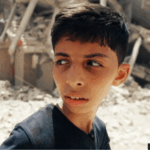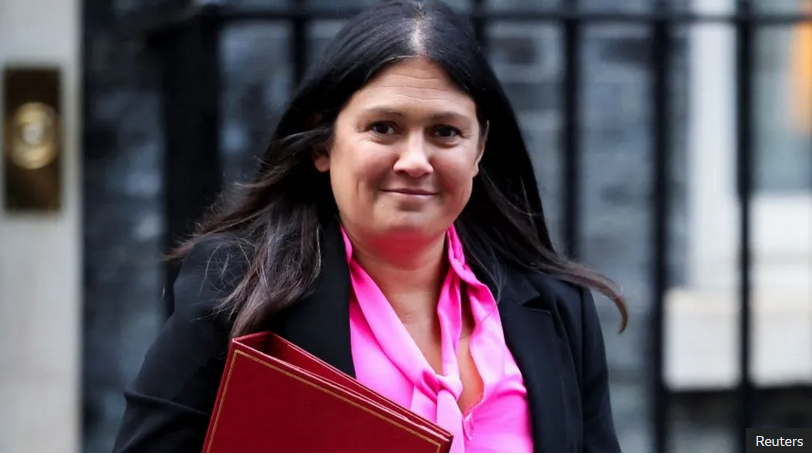
A BBC documentary about Gaza breached editorial guidelines on accuracy by failing to disclose the narrator was the son of a Hamas official, the corporation’s review has found.
BBC director general Tim Davie commissioned the review into Gaza: How to Survive a War Zone, after it was pulled from iPlayer in February when the boy’s family connections emerged.
The review found that the independent production company, Hoyo Films, bears most of the responsibility for the failure. But it also said the BBC bore some responsibility and should have done more in its oversight.
The BBC said the programme should not have been signed off, and it was taking appropriate action on accountability.
The review found three members of the independent production company knew of the father’s position as deputy minister of agriculture in the Hamas-run government in Gaza, but no-one within the BBC knew this prior to broadcast
However, the report criticised the BBC team for not being “sufficiently proactive” with initial editorial checks, and for a “lack of critical oversight of unanswered or partially answered questions” ahead of broadcast.
The review also said it had seen no evidence “to support the suggestion that the narrator’s father or family influenced the content of the programme in any way”.
It added the narrator’s scripted contribution to the programme did not constitute a breach of due impartiality.
However, the report concluded that the use of the child narrator for this programme was “not appropriate” in the circumstances.
The BBC said it was taking a number of steps to prevent a similar breach being repeated:
- The corporation will create a new leadership role in news documentaries and current affairs. The new director role on the BBC News board, which will be advertised in the next week, will have strategic leadership of its long form output across the news division
- New editorial guidance will be issued that careful consideration must be given to the use of narrators in the area of contested current affairs programmes, and that the narrator will be subject to a higher level of scrutiny
- A new “first gate” process will be introduced, meaning “no high-risk long form programmes can be formally commissioned until all potential compliance considerations are considered and listed”
The review found the production company did not intentionally mislead the BBC, adding: “They made a mistake, and should have informed the BBC about it. The BBC does also bear some responsibility for this failure.”
Hoyo Films said it took the reviews findings “extremely seriously” and said it “apologises for the mistake that resulted in a breach of the editorial guidelines”.
The company said it was pleased the report had found there was “no evidence of inappropriate influence on the content of the documentary from any third party”.
It said it welcomed the report’s recommendations and “hope they will improve processes and prevent similar problems in the future”.
Hoyo Films said it would work closely with the BBC to explore the possibility of using some material for re-edited and re-versioned shorter films for archive on iPlayer.
The BBC’s director general Tim Davie apologised, saying the report “identifies a significant failing in relation to accuracy”.
“We will now take action on two fronts,” he continued. “Fair, clear and appropriate actions to ensure proper accountability and the immediate implementation of steps to prevent such errors being repeated.”
The corporation did not name any individuals facing disciplinary action.

A financial examination as part of the review found that a fee of £795 was was paid for the narrator, paid to his adult sister, an amount which was not “outside the range of what might be reasonable in the context”.
The boy also received a second-hand mobile phone and gift card for a computer game. Together with the fee, that amounted to a total value of £1,817.
The review also found there was “significant resource strain within both the production company and the BBC” ahead of the programme’s broadcast.
Following the review’s publication, when asked if she still had confidence in Davie, Culture Secretary Lisa Nandy said: “It’s not for the government to say who should and shouldn’t work at the BBC.
“My job is to make sure that we uphold the highest standards and that the public and parliament can have confidence in the BBC.
“I think, given the recent events, that has been called into question, but the BBC in recent weeks has made big strides to try to reset that relationship with the public, and show that they have grip on the very very serious issues.”
Nandy said she had met Davie and BBC chair Samir Shah last week. She added: “It is important that the BBC has acknowledged that there have been a series of catastrophic failures over recent weeks.”
The review was conducted by Peter Johnston, the BBC’s director of editorial complaints and reviews.
Speaking after its publication, BBC News CEO Deborah Turness told Radio 4’s The World at One: “We are owning where we have made mistakes, finding out what went wrong, acting on the findings, and we’ve said we’re sorry.”
She said the BBC figures overseeing the documentary should have known about the boy’s position before transmission, “because their questions should have been answered by the independent production company”.
The team who worked on the review identified and considered 5,000 documents from a 10-month production period, as well as 150 hours of material filmed during production, to inform Mr Johnson’s conclusions, the BBC said.
The BBC Board said: “Nothing is more important than trust and transparency in our journalism. We welcome the actions the Executive are taking to avoid this failing being repeated in the future.”
But the campaign Against Antisemitism launched a scathing attack on the BBC after the report was published, saying its recommendations were “frankly insulting”.
“The report says nothing we didn’t already know: paying licence fee money to a Hamas family was bad,” the CAA said. “The report yields no new insight, and almost reads like it’s trying to exonerate the BBC.”
More than 40 Jewish television executives, including former BBC content chief Danny Cohen and JK Rowling’s agent Neil Blair, previously wrote to the BBC with questions about editorial failings surrounding the film.
Separately, 500 media figures including Gary Lineker, Anita Rani, Riz Ahmed and Miriam Margolyes signed an open letter in February in support of the film.
Dame Melanie Dawes, CEO of broadcast regulator Ofcom, said the BBC had been slow to get a grip on recent scandals such as the Gaza documentary as well as the broadcast of Bob Vylan’s controversial set at Glastonbury.
Speaking to Sunday with Laura Kuenssberg, she said there was a “real risk” recent events could lead to “loss of confidence” in the broadcaster, adding: “It’s very frustrating that the BBC has had some own goals in this area.”
In June, the BBC pulled another documentary titled Gaza: Doctors Under Attack, due to impartiality concerns it had surrounding the production. That film was then broadcast by Channel 4.
